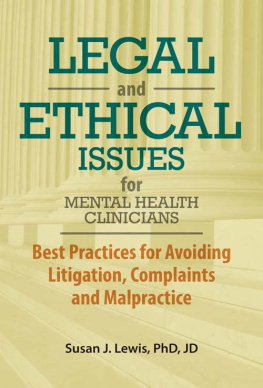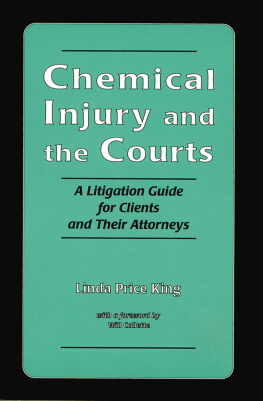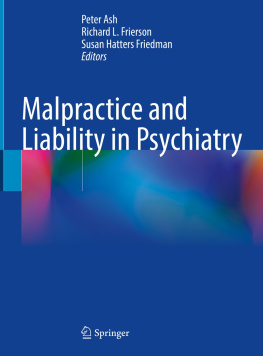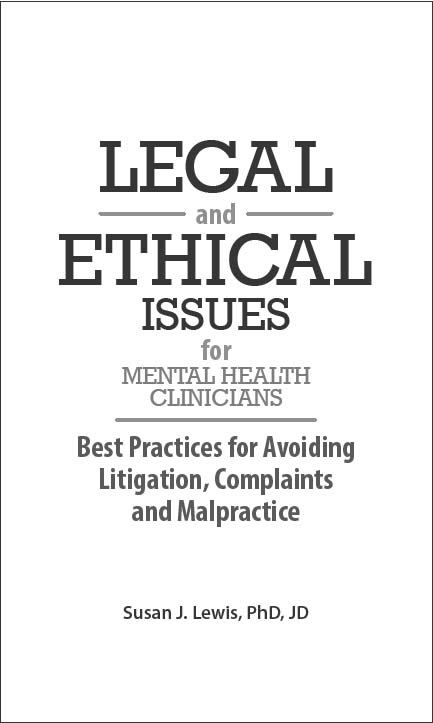Copyright 2016 by Susan Lewis, PhD, JD
Published by
PESI Publishing & Media
PESI, Inc
3839 White Ave
Eau Claire, WI 54703
Cover: Matt Pabich
Editing: Bookmasters
Layout: Bookmasters and Amy Rubenzer
ISBN: 9781683730125
All rights reserved.
Printed in the United States of America.
PREFACE
When PESI asked me to write this book, I was overwhelmed. But, I was ignited by the richness of research and my own curiosity. Deep inside I am both a teacher and learner. It has also been my privilege throughout my life to practice clinical and forensic psychology. I entered Boston University School of Law later in my life. Law has allowed me to practice forensic psychology in prisons, courts and forensic hospitals. The law has guided my abilities to give expert testimony and lessen sweating. It has also been an honor to teach in university settings, to students, supervisees and colleagues. PESI has enabled me to teach for many years across the United States, which has allowed me to combine law and ethics in the context of the mental health field with a diversity of people.
I am indebted to my colleagues who attended my lectures on this topic and gave me feedback and suggestions. Their wisdom has guided the content of this book.
Linda Jackson, from PESI, served as my cheerleader throughout this project. She was always supportive and complementary of my work whether it deserved it or not.
Cynthia Dibble encouraged me to write although I would rather have watched television. She ensured that I ate, took my dogs for a walk and made certain I saved my work in the event of a computer catastrophe!
My parents treated education as a priority, which encouraged my travels through lifelong learning. I am indebted to them for exposing me to many different avenues for education.
It is my sincere hope that this book will add to your knowledge and critical thinking, and that my sense of humor sprinkled throughout will make you chuckle.
_________________________
CHAPTER
RISK MANAGEMENT
_________________________
Why write a book about law and ethics? Those of us who have entered the field of mental health, in whatever capacity, usually hold the highest levels of integrity and ethics. Why else would anyone enter a helping profession?
Have you ever been in a situation where a client has become enraged with you and threatens to file a malpractice action or a licensing complaint against you? Or, have you made a mistake or done something wrong and you worry that when discovered it will precipitate similar actions? There are hundreds of scenarios that are similarly frightening.
As a budding clinician in graduate school and my internships, I was essentially taught to be a loving, caring, warm human being and capable therapist. The legal system was not touched upon as an important subject matter. My job was to marry my clients and be loyal to them. It was of no concern for me whether they got better or worse, gained insight or not, or benefitted. This was marriage without the option of divorce.
I was lied to.
Society has become far more litigious than ever before. If an individual believes he or she has been harmed, whether inadvertently or with intention, that individual often seeks solutions through legal channels.
Any of us can be sued for anything at any time.
This doesnt mean that all suits will end up in a court of law. Some will be deemed frivolous and proceed no further. Others may not be lucrative enough to beckon the legal profession to take on the challenge. Some will require legal counsel, which is anxiety producing and possibly costly.
Some organizations assure their employees that they will be covered by malpractice policies the agency, hospital, etc., maintains. No need to have your own individual liability insurance. What a generous offer!
However, be crystal clear that each organization is interested in its own viability and the minimization of risk. The organization does not retain its lawyers to ensure adequate representation of its constituency. Simply stated, you will be thrown under a bus alone.
In my thirty years in the field of psychology I have witnessed colleagues who have been sued or had licensing complaints filed against them. Before
Always maintain your own malpractice coverage and read the fine print.
the case reaches resolution, these individuals have lost their source of income, their self-confidence in their expertise, and the reliance on years of education as a foundation for their work. It is career changing and hard to recover from. The penalties imposed by state boards can be costly, lengthy and burdensome. Henceforth, any application for relicensure, which will ask you about board complaints or legal suits, will need to be answered with a yes. Movement from state to state is curtailed because each state will ask the same question. Individual malpractice insurance will increase in price dramaticallyyou have been branded. A malpractice finding against you could be costly not only in legal fees but remuneration for damages.
Risk management is essential. Practicing proactively is part of this strategy.
As I previously stated, we can all be sued for anything, but it is better to protect ourselves in advance as best we can. This book is about protection. I will present case studies, relevant examples, and talk about what questions we may be asked if we are called to the stand for courtroom testimony. I hope that some of the examples will bring peace of mind as there are preventative steps one can take to minimize the risk of being sued.
The information is not designed to frighten you but to help you be cognizant of pitfalls, and also offer tips to minimize the risk of such occurrences. My goal is for participants to leave my workshops feelings less anxious and more equipped to address the risks of practice.
We are supervisors as well as clinicians. When we train students, I believe we all have the intention of helping each one learn and step into his or her new professional roles. These new students practice under our licenses.
Supervision is a very high-risk endeavor. Let me start with a sobering example.
Case Example
A student was under the tutelage of a licensed clinician for twelve months of a training internship. Twice a week they met for an hour and discussed the content of the conversations the student was having with his clients. The supervisors methodology required that the supervisee take notes during the session with clients as well as record in-progress notes and summaries of each meeting. Supervisor and supervisee also devoted time to psychodiagnostic assessment and constantly reviewing the course of treatment chosen.
One of a supervisors tasks is to review the client record each week to make certain the student complies with the guidelines. Not uncharacteristically, this supervisor was working with five students simultaneously. As you can well imagine this produced mounds of paperwork. The supervisor had to cosign each written page by each student.
The reading of each word in every record is laborious. In addition, in order to protect the confidentiality of each client, the record must remain in the record room, meaning many late evenings.

















